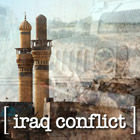
|
BIDEN-GELB PLAN FOR 'SOFT PARTITION' OF IRAQ WINS FAVOR
US SAID TO BE LOOKING AT THREE AUTONOMOUS REGIONS UNDER ONE CENTRAL GOV'T AS PATH TO PULLOUT 3 August 2007 The Iraq conflict has become exactly what it's proponents said it would never become, a bloody sectarian quagmire, threatening to rip the country apart along ethnic and confessional lines. Many warned that Iraq would be another Yugoslavia if its socialist dictatorship were toppled, splitting along ethnic and religious lines and descending into uncontrollable internecine violence. Could separating the three main communities, giving each a regional government, be the path to peace? An as yet little touted plan by proposed in a May 2006 opinion piece by US senator Joe Biden and Leslie Gelb, former president of the Council on Foreign Relations, is getting recognized for its apparent pragmatic viability. The Biden-Gelb proposal is being called a plan for 'soft partition' of Iraq, allowing for the nation to stay united under one central government, in Baghdad, with three autonomous regions, each governed by a cultural majority: Shi'a and Sunni Arabs, and Kurds. The plan would set up a new Iraqi state with separate governments for 'loose', or rather, not ethnically mandated, blocs that would be effectively 'Kurdistan', 'Sunnistan', and 'Shiastan'. Many have believed this would be a disastrous end to a conflict that was intended to create one pluralist democracy with its seat in Baghdad, but in the face of mounting bloodshed and the apparent inefficacy of foreign troops, it seems increasingly to be the optimal outcome, and possibly the only way to prevent a real fragmentation of the country. Biden and Gelb also lay out a diplomatic strategy for persuading all parties involved that this would be the safest bet and the most favorable outcome for all invovled. IHT cites the May 2006 opinion article co-written by Biden and Gelb as specifying "We could drive this in place with irresistible sweeteners for the Sunnis to join in, a plan designed by the military for withdrawing and redeploying American forces, and a regional nonaggression pact." The regional non-aggression pact has already been discussed at meetings held with regional governments, including the first high-level talks between the White House and the Iranian government in nearly three decades. Washington has come to view the assistance of the insurgents' foreign backers as necessary collaborators in any serious project to secure Iraq and prevent the violent fragmentation of the country. As members of Congress opposed to the war have pushed for a timetable for withdrawal, each successive vote has garnered increased support among Republicans. This leads to the very real possibility that a bill will be presented to Pres. Bush calling for a phased troop withdrawal sometime between now and the end of his term, so legislators and policy-makers are looking at what would be a 'responsible' option for leaving Iraq more or less safe from all-out civil war. [s]
RELATED STORIES: Diplomats from the US and Iran have met in direct talks for the first time in more than a quarter century. There was little anticipated to be gained from the meeting, except perhaps a premise for future security negotiations and a possible increase in mutual confidence in the goal of securing Iraq. The meeting was described by participants as "businesslike", Iran proposed a three-way forum to negotiate security solutions. [Full Story] SENATE VOTES TO IMPOSE MARCH 2008 TIMELINE FOR WITHDRAWAL FROM IRAQ The United States Senate has voted to impose a timeline for withdrawal from Iraq by March 2008. The move comes only days after the House voted to include a deadline for withdrawal in its war-funding legislation. The Senate has not yet passed the full funding bill, but it is unlikely the wording will now be altered or removed. [Full Story] HOUSE VOTES TO ORDER US TROOPS TO LEAVE IRAQ BY AUGUST 2008 Even as Pres. Bush has increased the troop "surge" to 28,000 additional soldiers in Baghdad, the US House today voted by simple majority to pass legislation requiring Bush to complete a "phased redeployment" of all combat personnel currently in Iraq by 2008. [Full Story] BUSH ANNOUNCES PLANS TO SEND 21,500 MORE SOLDIERS TO IRAQ After much speculation and many leaks, US pres. George W. Bush has announced he will send more than 20,000 additional soldiers into Iraq warzone, will require Iraqi government to take action against sectarian movements fomenting violence across Iraq. Bush also said that "Where mistakes have been made, the responsibility rests with me". [Full Story] SENATE REPORT SAYS HUSSEIN NEVER HAD AL-QAEDA TIES As the 5th anniversary of the attacks of 11 September 2001 approach, the US Senate's Intelligence Committee has issued a report officially finding that Saddam Hussein never collaborated with al-Qaeda in any sense. In fact, he was hunting Abu Musab al-Zarqawi, who would later name his organization "Al-Qaeda of Mesopotamia" or as per Pentagon briefings "Al-Qaeda in Iraq". [Full Story] DESPITE THOUSANDS OF CIVILIAN DEATHS, FEW MURDER CASES HAVE BEEN BROUGHT IN IRAQ WAR While prisoner abuse has been a widely reported charge, with shocking images and public outrage to keep attention on the subject, there has been relatively little similar public outrage expressed over situations where civilians have died in questionable circumstances. The Washington Post reports there has been a tendency not to investigate many such deaths, with top officials saying "in private" that there's "a tendency to consider Iraqi civilian deaths an unintended consequence of combat operations". [Full Story] MOST WANTED INSURGENT LEADER KILLED IN AIR-STRIKE Reports from Baghdad suggest Abu Musab al-Zarqawi was killed by a US airstrike on 7 June 2006. The official announcement was made by Iraq's prime minister Nouri al-Maliki, and was later confirmed by US Gen. Casey. The White House issued a statement of cautious relief, saying the removal of Zarqawi could be a moment of hope for Iraq, but will not end the ongoing sectarian and insurgent violence. [Full Story] NO WMD, JUSTIFICATIONS FOR WAR IN QUESTION David Kay, chief weapons inspector for the Iraq Survey Group, who recently left his post, reports there was no evidence to indicate the presence of any weapons of mass destruction, any stockpiles, or any competent programs to develop such weapons. Kay said evidence was found that indicated there had been programs in the past, but that it appeared that all the weapons had been destroyed, and that the programs were in disarray, and no production facilities existed. [Full Story] |
||||||||||
|
|||||||||||







